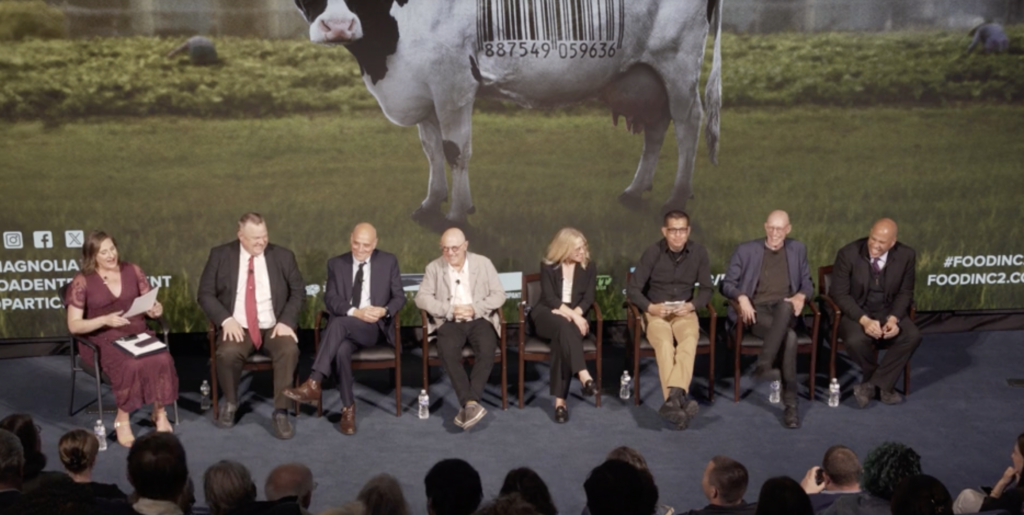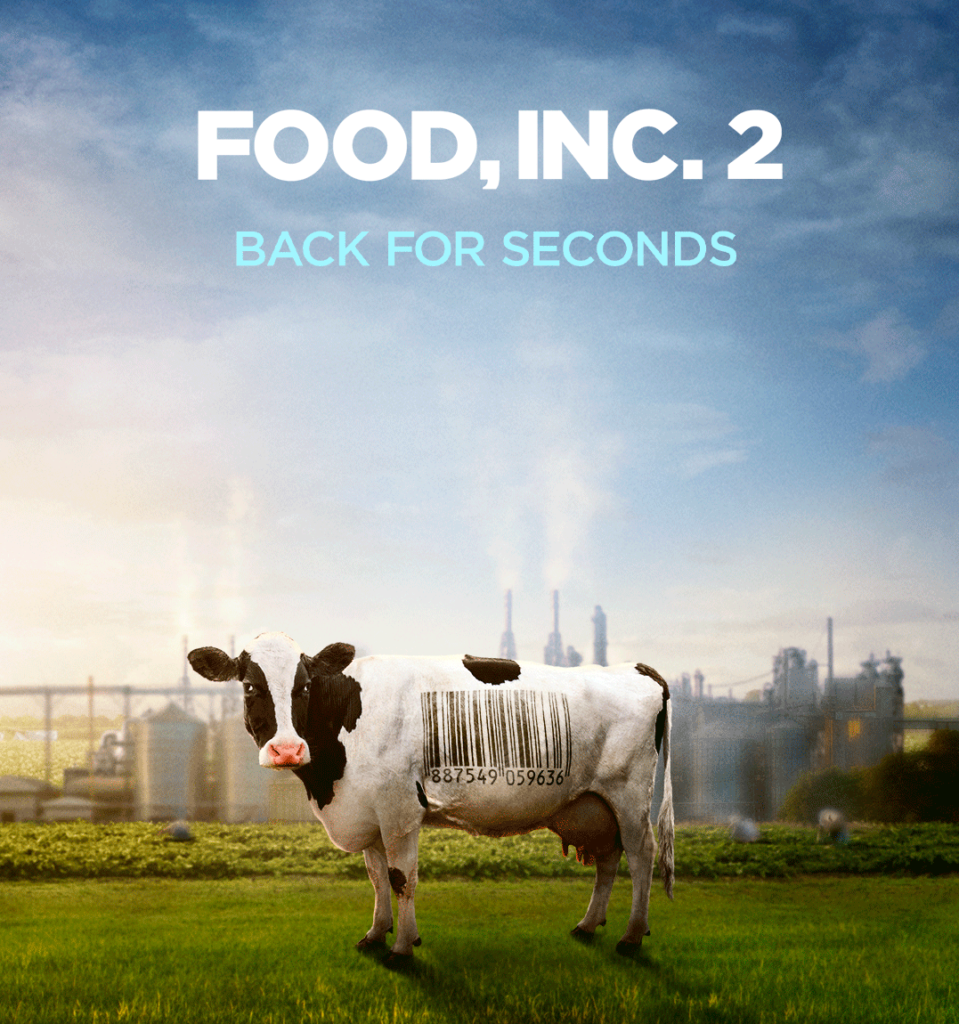
Gerardo Reyes Chavez, farmworker and senior staff member of the CIW, speaking on a panel at the DC screening of “Food, Inc. 2:” “Workers in other parts of the US and the globe today want to replicate the protections we have created for workers in the fields in their own realities…. The time for Worker-driven Social Responsibility has come.”
Senator Cory Booker on Mr. Chavez and the CIW:“Sincerely, I was floored and blown away by what this man has accomplished with others in organizing both here in the United States and across the world, giving people not just dignity and fair wages, but [standing with] people who had been rendered invisible in the most demanding and degrading way; a truly heroic individual.”
“Food, Inc. 2,” the highy-anticipated sequel to the Oscar-nominated 2008 documentary “Food, Inc.” is now out in theaters and on streaming platforms including Amazon Prime!
The documentary tells the story of a food industry in dire need of reform — including the now familiar tales of factory farms squeezing workers at the very bottom of the industry and the corporate behemoths squeezing suppliers to their breaking point at the very top. But the sequel also tells the story of several proven solutions that give hope that a more humane food industry is, in fact, possible.
The film showcases the CIW’s Fair Food Program as a laudable example of a solution through interviews with Gerardo Reyes Chavez, a farmworker and key figure in both the Campaign for Fair Food and the Fair Food Program, who tells the story of the birth and growth of the FFP as the model for protecting human rights in food industry supply chains in the 21st century.
“Food Inc. 2’s” nationwide release kicked off with a series of screenings and panels in early April. The DC screening — where a long line of hopeful attendees was turned away at the door from the sold-out showing — was jam-packed with Hollywood actors, prominent policymakers, and advocates who stuck around in the standing room-only theater for a panel discussion following the screening. That panel, moderated by Helena Bottemiller Evich, founder of Food Fix, featured Senators Jon Tester, Cory Booker, “Food, Inc. 2” co-directors Robert Kenner and Melissa Robledo, award-winning author Eric Schlosser, public intellectual Michael Pollan, and of course, Gerardo Reyes Chavez.
Reflecting on his experience toiling in the fields for years, Mr. Chavez spoke of the importance of CIW as a source of hope for farmworkers including himself, organizing for basic dignity in agriculture, and in the process, forging a new dawn of human rights for low-wage workers all across the globe. We’re sharing a partial transcript of Chavez’ remarks here for you, as well as press coverage of the film’s Palm Beach screening, which also features an interview with Mr. Chavez.
“The Fair Food Program is our response as a community. We started to go after the market to search for a solution to the abuses that plagued the agricultural industry. In an effort to change all that in a systematic way, we pursued agreements with the buyers, because we knew the power is there. The agricultural industry is a sub-sector of the retail food industry in this country, so the power is really in those corporations.
“We started with Taco Bell, then we went to McDonalds, and Burger King. In total, we have 14 corporations that have signed onto the Fair Food Program, committing to buy from farms that are implementing a list of rights that are included in the [Fair Food Program Code of Conduct]… what that does is gives workers the power to be able to complain without being afraid of retaliation… That is fundamentally changing the conditions and the situations we used to confront every day. So the FFP started in Florida, it started in tomatoes, but since then it has expanded to many other crops… It is something that is very powerful, because it guarantees that workers don’t have to give up their dignity while working in the fields.”
“…Workers in other parts of the US and the globe today want to replicate the protections we have created for workers in the fields in their own realities. An example I can think of in the US is Migrant Justice within the dairy industry. They replicated, with our support, protections for their own industry in a program called Milk with Dignity. Across the globe, there is the Bangladesh Accord that is protecting workers with the main focus on health and safety, so WSR is being implemented there. It’s also being implemented in Lesotho to protect female workers against sexual assault and harassment, it’s been expanded to Pakistan. Right now, we’re in conversation with workers in the fishing industry, both in the production of salmon in Chile and workers on fishing boats [in the UK] that go out to sea for 8 months at a time who didn’t have protections, and were afraid of speaking up against their bosses. They are now looking into the Fair Food Program, along with organizations like the International Transport Workers’ Federation, who are seeking to land this with us. So the time for Worker-driven Social Responsibility has come. I hope that everyone here can support it too.”
In response to Mr. Chavez’ remarks, co-panelist and Senator Cory Booker told the audience: “Sincerely, I was floored and blown away by what this man has accomplished with others in organizing both here in the United States and across the world, giving people not just dignity and fair wages, but [standing with] people who had been rendered invisible in the most demanding and degrading way; a truly heroic individual.”
Speaking personally on the myriad hardships of life as a farmworker, Mr. Chavez said:
“Many of us in Immokalee, we arrived [in the US] and we’re alone, we miss the food of our mothers – all of us. But in our reality, we knew that we had to fight, we needed to stand up against the forces on top of the industry if we wanted to change that reality. If you’re a farmworker earning the same wages for three decades or more, you’re not going to be able to think about organic, good food–or any of that conversation; we’re detached from it. At the same time, society has a very quick tendency to discard the voice of those who are working in the fields. I worked in the fields with some of my colleagues… I know what it feels like to feel alone, that there is no possibility for change: that is why I joined the Coalition of Immokalee Workers.”
Mr. Chavez then singled out Wendy’s and Kroger as holdouts to the FFP:
“…There are still corporations that have not signed onto the Fair Food Program like Wendy’s and Kroger, that was actually buying from an operation in which workers were harvesting watermelons in modern slavery conditions – they escaped in the trunk of a car and then called us, which started the investigation. We need to stop that. That’s a disgraceful way in which the market operates without us even realizing that’s going on.”
The national premiere of “Food, Inc. 2” also included a screening and panel discussion in the Palm Beach area, home to Wendy’s Chairman Nelson Peltz, the billionaire activist investor whose company has, for over a decade, refused to heed the call from farmworkers and consumers to join the FFP. NPR and PBS’ South Florida member station, WLRN, covered the screening and interviewed Gerardo Reyes Chavez on the film and on Wendy’s ongoing refusal to join the Presidential Medal-winning program.
Below is an excerpt of that coverage: for the full article and segment, click here

‘Food, Inc 2′ looks at a Florida farmworkers’ rights group — and its Palm Beach fast food foe
The sequel to an Oscar-nominated documentary that scrutinized corporate farming in America is bringing international attention to a Florida-based farmworkers’ rights organization — and their battle against an infamous Palm Beach-based fast food boss.
“Food, Inc. 2”, which premiered last week in West Palm Beach, features farming experts and lawmakers probing the nation’s “efficient yet vulnerable food system,” according to the film’s synopsis.
Filmmakers Melissa Robledo and Robert Kenner argue that profit-driven corporations have robbed workers of a “fair living wage” and proliferated, through the use of ultra-processed foods, what it calls an “international health crisis.”
The first film, released 16 years ago, helped spark a national conversation about the effects of America’s industrialized food system.
But the sequel suggests much work remains to be done — something that hits close to home for workers’ rights activists in Florida. In fact, the film highlights the work of the Coalition of Immokalee Workers (CIW), a worker-focused human rights organization that is rooted in the state.
The group are behind the Fair Food Program, which started with tomato growers in Florida and has since expanded to a dozen states and several countries. The initiative seeks to ensure workers are afforded on-the-job protections against wage theft, extreme heat and sexual harassment.
CIW senior staff member Gerardo Reyes Chavez, who is featured in the film, says the documentary places a spotlight on the ongoing effort to increase projections for farmworkers.
“It connects you to the people behind your food,” Chavez told WLRN. “Without workers, there would not be food on the table for any of us.”
The documentary demands “more corporations to be part of the solution instead of being part of the problem” and to stop “perpetuating the conditions that for too long have impacted workers in such negative ways,” Chavez said.
…”It’s time to be able to recognize the humanity of those who makes our lives possible and comfortable,” he added. “Not from a place of pity because they’re suffering on the fields, but from a place of solidarity, recognizing the importance of the humanity of workers that are the backbone of so many different companies, so many different industries within the food system,”
The film comes a week after nonprofit Yield Giving, founded by billionaire philanthropist and author MacKenzie Scott, announced a $2 million grant to help CIW and the Fair Food Standards Council expand the Fair Food Program and improve working conditions and wages. The donation was part of a hundreds of millions of dollars Scott pledged to nearly 400 nonprofits.
Make sure to check out “Food, Inc. 2” either on streaming or at your local theater!

